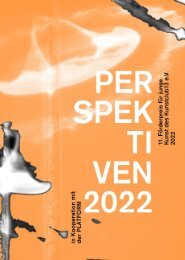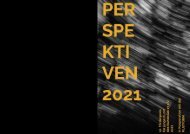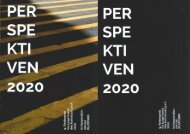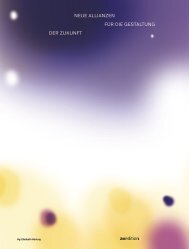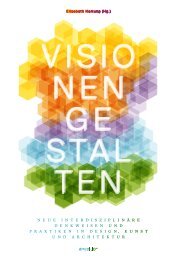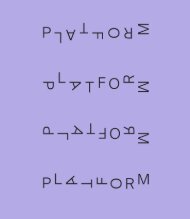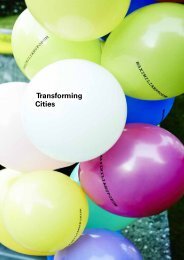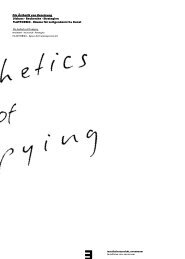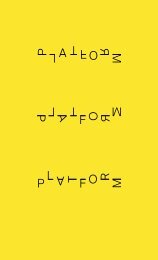FUTURES
Publikation zum 2. Jubiläum von PLATFORM3 München, als Ergänzung zum Künstlerkatalog PLATFORM3 works. Die Natur dieser Publikation ist ausdrücklich dokumentarisch. Fotografien: Jörg Koopmann. Herausgeber: Birgit Pelzmann, Nikolai Vogel, Marlene Rigler für PLATFORM3-Räume für zeitgenössische Kunst. München, 2011
Publikation zum 2. Jubiläum von PLATFORM3 München, als Ergänzung zum Künstlerkatalog PLATFORM3 works. Die Natur dieser Publikation ist ausdrücklich dokumentarisch. Fotografien: Jörg Koopmann.
Herausgeber: Birgit Pelzmann, Nikolai Vogel, Marlene Rigler für PLATFORM3-Räume für zeitgenössische Kunst. München, 2011
Erfolgreiche ePaper selbst erstellen
Machen Sie aus Ihren PDF Publikationen ein blätterbares Flipbook mit unserer einzigartigen Google optimierten e-Paper Software.
“The future is wide open” —<br />
on prophecy, projection, and the urge to know<br />
Sara Duana Meyer<br />
‘Clairvoyant’ is not exactly a presentable job these days, and prophets<br />
don’t have it any easier, even though humanity’s urge to see into<br />
their future has not waned since the days of antiquity when Delphi<br />
was hailed as the center of the world – its particular condition<br />
determined by the arguably random GPS of two eagles which Zeus<br />
had released from separate ends of the earth to see where their<br />
paths crossed. This early legend, which awards special status to the<br />
place where the future can be foreseen, points to the overlapping<br />
coordinates of time and space and reminds us that time as the fourth<br />
dimension of the universe is actually an age-old concept.<br />
What can one say about ‘the future’? Not much, for its most<br />
striking characteristic is its indeterminability. The future can be<br />
dark or rosy, promising or forbidding. Nothing is more exciting than<br />
what the future holds in store: as long as it does what it does<br />
best and stays out of reach, everything is possible, even simultaneous<br />
multiple realities.<br />
But the sobering fact remains that – in a linear-thought<br />
system governed by the laws of physics – the future is also something<br />
else: it is completely unavoidable. And herein lies its paradox:<br />
the future follows upon the present, which forces our focus onto<br />
something ‘coming after’ instead of ‘lying ahead.’ This entails that our<br />
present, this fleeting moment of transit, of inbetween, ultimately<br />
ends where the future begins; and it is not by accident that our<br />
ambivalent fears of the unpredictable are expressed and portrayed<br />
in countless versions of an impending apocalypse.<br />
The arts have been the sounding board and experimentation<br />
field for many a quest to understand the future. Well known<br />
in this regard are the Futurists of the early twentieth century,<br />
who passionately despised everything from ‘the past’ which to them<br />
reeked of reactionary tradition and was to be discarded. Excited,<br />
instead, by new technologies, they saw forceful speed and<br />
aggression as the necessary tools for change. Utopias came at a<br />
high premium at the time, for they provided counter versions of the<br />
status quo, of the ‘now’.<br />
Our 21st century reality, however, is haunted by the sense<br />
of having finally arrived in the future. Is this so? Have we managed<br />
to break out of the space-time-continuum?<br />
Recent decades have seen massive upheavals and radical<br />
changes, on a scale that no one could have imagined a hundred<br />
years ago. Or could they have? If a prophet had foretold our day-today<br />
life, would they have been heard? The seer would have<br />
envisioned a global dissolution of boundaries, or, as Gilles Deleuze<br />
coined it, deterritorialization – transnational mechanisms conveyed<br />
in a constant flux of commodities, bodies and information. Global<br />
flows for which the economically charged term ‚transfers‘ seems a<br />
much better fit than the neo-platonic concept of panta rei. And even<br />
the prefix ‘post’ – be it that of modernism or that of colonialism –<br />
appears to have exhausted itself, giving way to the literal common-<br />
23




